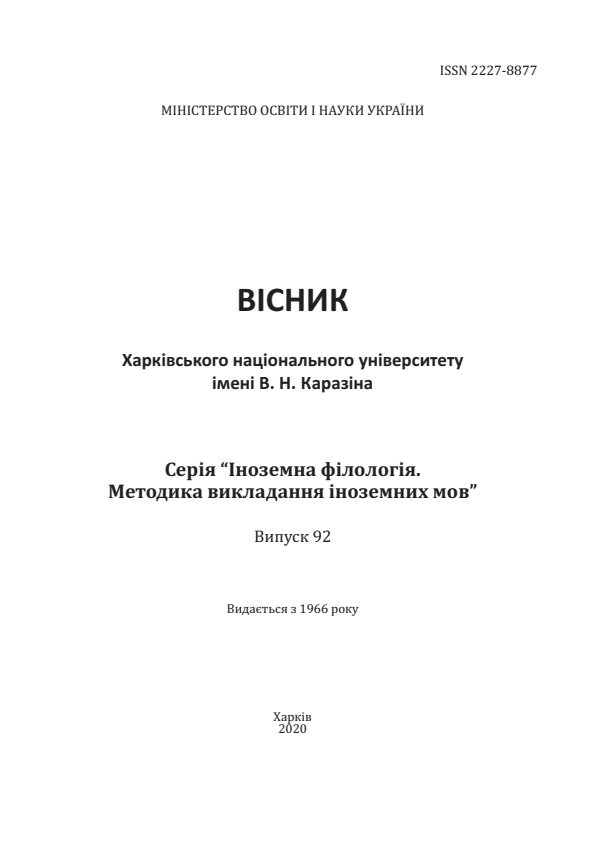Як перекладачі грають в мовні ігри (і перемагають): експериментальне дослідження
Анотація
Статтю присвячено експериментальному висвітленню особливостей перекладу номінативних проявів мовної гри в науково-популярному дискурсі. За основу взято діяльнісне тлумачення мовної гри в працях Людвіга Віттгенштайна та Йохана Хьойзінги, відповідно до якого її різновидами можуть вважатися номінативні акти та переклад. За матеріал дослідження обрано квазітерміни – новоутворення науково-популярного дискурсу, створені з метою не тільки позначити нові об’єкти наукової рефлексії, а й надати контекстові експресивного забарвлення (конотації термінологічності). Спочатку ми алгоритмічно змоделювали потенційні перекладацькі стратегії інтерпретації та іншомовного відтворення квазітермінів, а потім розробили та втілили в життя ретроспективний експеримент для верифікації зазначених психолінгвістичних стратегій. Учасниками експерименту стали 34 напівпрофесійні інформанти – студенти магістерського рівня, які виконали переклад уривків текстів із науково-популярних видань і надали звіти у вигляді відповідей на запитання щодо відтворення контрольних одиниць (квазітермінів). Відсутність стандартизованого підходу до розв’язання різних типів перекладацьких труднощів сукупно з високим рівнем мовної компетентності визначають доцільність залучення напівпрофесіоналів до експериментального вивчення перекладацьких стратегій. Аналіз результатів експерименту не тільки підтвердив валідність змодельованих стратегій, а й дозволив описати перекладацькі рішення в термінах теорії ігор. Зокрема, намагаючись створити відповідник безеквівалентного квазітерміну на основі використаної автором моделі та словотвірних компонентів (стратегія імітації або дзеркального відбиття), перекладачі слідують заданим ним правилам гри, тоді як пропонуючи інші моделі та/або словотвірні компоненти (стратегія компенсації), вони упроваджують свої власні правила відповідно до обставин нової ситуації. В будь-якому разі, відтворення квазітерміну у лексикалізованій формі може вважатися перекладацькою перемогою, тоді як його вилучення з цільового тексту має розцінюватися як поразка. Описовий переклад посідає проміжну позицію, оскільки, з одного боку, дозволяє відтворити зміст оригінальної одиниці, але з іншого боку, втрачає її лексикалізовану форму, а разом із нею конотацію термінологічності.
Завантаження
Посилання
/Посилання
Alekseeva, M. V. (2015). Typologycheskye osobennosty nauchnogo teksta: gypertekstovaya typologyya yazyka nauky [Typological Specificities of Scientific Text: Hypertextual Typology of Scientific Language]. Moskva: Izd. Dom MISiS Publ. (in Russian)
Vitgenshtajn, L. (1995). Tractatus Logico-Philosophicus. Filosofs`ki doslidzhennya [Tractatus Logico-Philosophicus. Philosophy Studies]. Kyiv: Osnovy Publ. (in Ukrainian).
Goverdovskyj, V. Y. (1987). Konnotacyya termynologychnosty [Connotation of Terms] Znacheny`e y` ego var`y`rovany`e v tekste: sb. nauch. trudov – Knowledge and Its Variety in the Text. Volgograd, 170–175. (in Russian)
Kudasova, O. K. (1983). Rol` stilisticheskogo priema v organizacii nauchnogo ocenochnogo teksta (na materyale anglijskoj nauchnoj recenzii) [The Role of Stylystic Tools in Organizing Scientific Appreciation Text]. Yazyk i stil nauchnogo izlozheniia. Lingvometodicheskiie issledovaniia – Language and Style of Scientific Interpretation. Moskva, 23–33. (in Russian)
Mykhajlovych-Getto, O. P. (2007). Konotaciya kvazitermina v reklamnomu teksti: spivvidnoshennya indyvidual`nogo ta kolektyvnogo [Connotation of Quasi-Term in Advertising Texts]. Visny`k SumDU. Seriya «Filologiya» – Visnyk of Sumy State University. Series “Philology”, 1, 156–160. (in Ukrainian)
Mishkurov, E. N. (2012). Yazyk, «yazykovye igry» i perevod v sovremennom lingvofilosofskom i lingvokul`turologicheskom osmyslenii [Language, Language Games and Translation in Modern Lingustic, Philosophical and Cultural Understanding] Vestny`k Moskovskogo universiteta Ser. 22. Teorija perevoda. – Moscow University Bulletin. Series 22. Theory of Translation, 1, 5–15. (in Russian).
Ushakova, A. O. (2017). Algoritmicheskie i evristicheskie mekhanizmy myshleniya perevodchika-lingvista [Algorythmic and Heuristic Mechanisms of Thinking of a Translator-Linguist]. Vestnik PNIPU. Problemy jazykoznanija i pedagogiki – PNRPU Bulletin. Issues of Linguistics and Pedagogy, 1, 60–67. (in Russian).
Cronin, M. (2005). Game theory and translation. In: Mona Baker (ed.). Routledge encyclopedia of translation studies. London and New York: Taylor & Francis Group, pp. 91–93.
Gile, D. (1980). Integrated Problem and Decision Reporting as a Translator Training Tool. The Journal of Specialised Translation, 2, 2–20.
Huizinga, J. (1980). Homo Ludens. A Study of the Play-Element in Culture. London, Boston and Henley: Routledge & Kegan Paul.
Jones, F. R. (2007). Unlocking the Black Box: Researching Poetry Translation Processes. In: Translation and Creativity. Perspectives on Creative Writing and Translation Studies. London, pp. 59–74.
Kussmaul, P., and Tirkkonen-Condit, S. (1995). Think-Aloud Protocol Analysis in Translation Studies. TTR: traduction, terminologie, redaction, 8(1), 177–199.
Online Etymology Dictionary. Available at: https://www.etymonline.com.
Rambæk, I. (2004). Translation strategies expressed in retrospective and concurrent verbal reports. Romansk Forum, 19, 7–19.
Алексеева М. В. Типологические особенности научного текста: гипертекстовая типология языка науки. Москва : Изд. Дом МИСиС, 2015. 100 с.
Вітгенштайн Л. Tractatus Logico-Philosophicus. Філософські дослідження. Київ : Основи, 1995. 311 с.
Говердовский В. И. Коннотация терминологичности. Значение и его варьирование в тексте: сб. науч. трудов. Волгоград, 1987. С. 170–175.
Кудасова О. К. Роль стилистического приема в организации научного оценочного текста (на материале английской научной рецензии). Язык и стиль научного изложения. Лингвометодические исследования. Москва, 1983. С. 23–33.
Михайлович-Гетто О. П. Конотація квазітерміна в рекламному тексті: співвідношення індивідуального та колективного. Вісник Сумського державного університету. Серія «Філологія». 2007. Т. 1, № 1. С. 156–160.
Мишкуров Э. Н. Язык, «языковые игры» и перевод в современном лингвофилософском и лингвокультурологическом осмыслении. Вестник Московского университета. Сер. 22. Теория перевода. 2012. № 1. С. 5–15.
Ушакова А. О. Алгоритмические и эвристические механизмы мышления переводчика-лингвиста. Вестник Пермского Национального Исследовательского Политехнического Университета. Проблемы языкознания и педагогики. 2017. № 1. С. 60–67.
Cronin M. Game theory and translation. Routledge encyclopedia of translation studies / Mona Baker (ed.). London and New York : Taylor & Francis Group, 2005. P. 91–93.
Gile D. Integrated Problem and Decision Reporting as a Translator Training Tool. The Journal of Specialised Translation. London, 2004. № 2. P. 2–20.
Huizinga J. Homo Ludens. A Study of the Play-Element in Culture. London, Boston and Henley : Routledge & Kegan Paul, 1980. 220 p.
Jones F. R. Unlocking the Black Box: Researching Poetry Translation Processes. Translation and Creativity. Perspectives on Creative Writing and Translation Studies. London, 2007. P. 59–74.
Kussmaul P., Tirkkonen-Condit S. Think-Aloud Protocol Analysis in Translation Studies. TTR: traduction, terminologie, redaction. Québec, 1995. № 8 (1). P. 177–199.
Online Etymology Dictionary. URL: https://www.etymonline.com.
Rambæk I. Translation strategies expressed in retrospective and concurrent verbal reports. Romansk Forum. 2004. № 19. P. 7–19.




